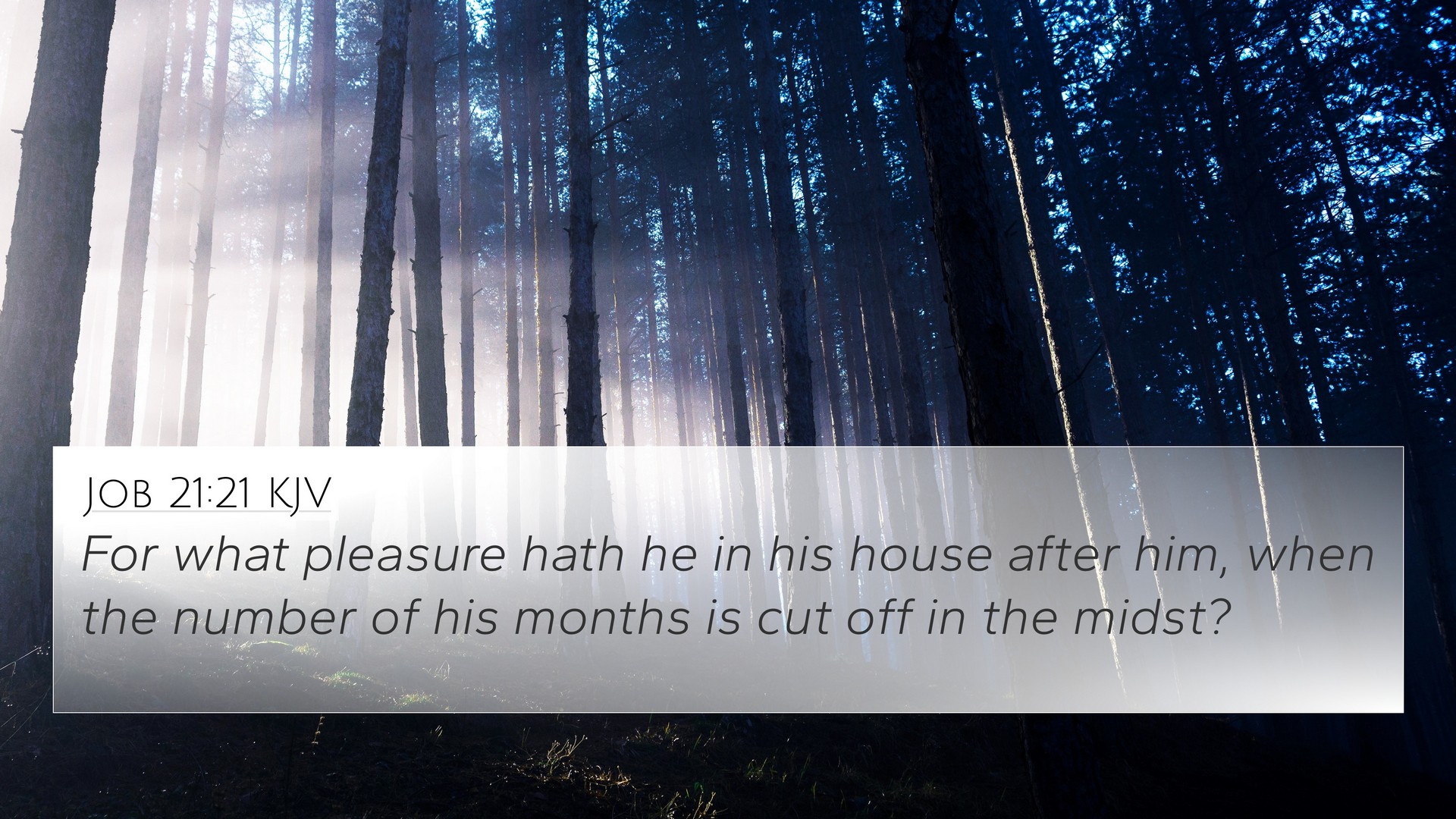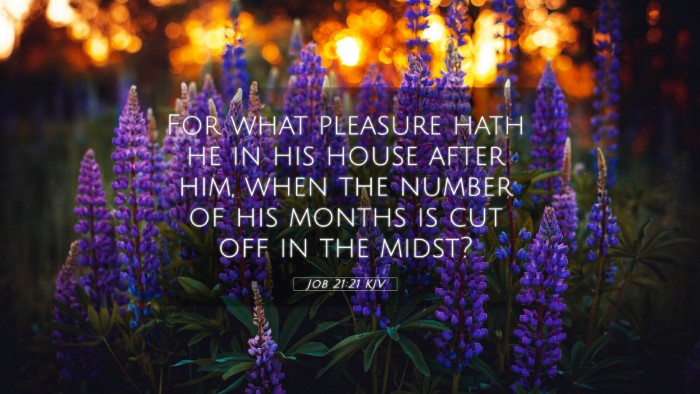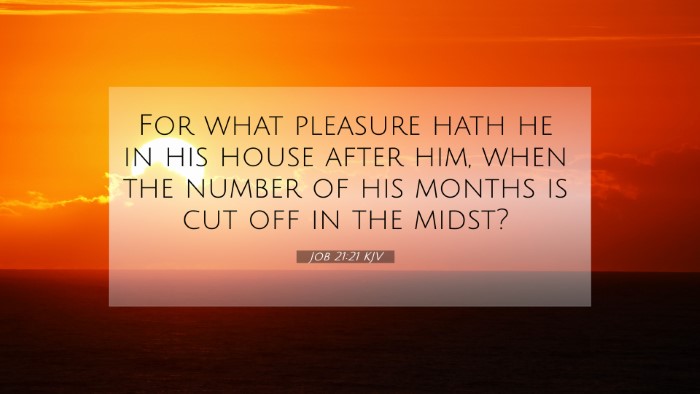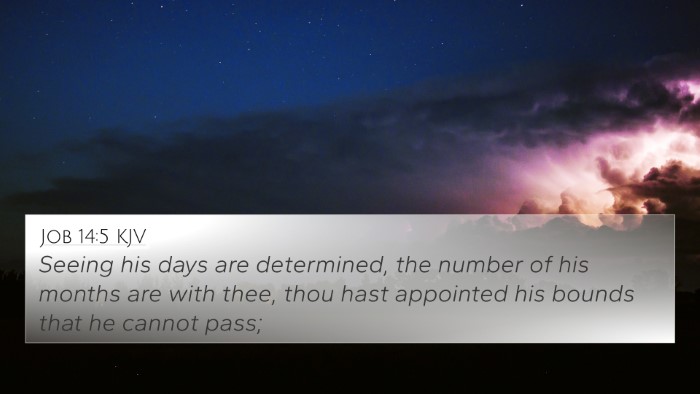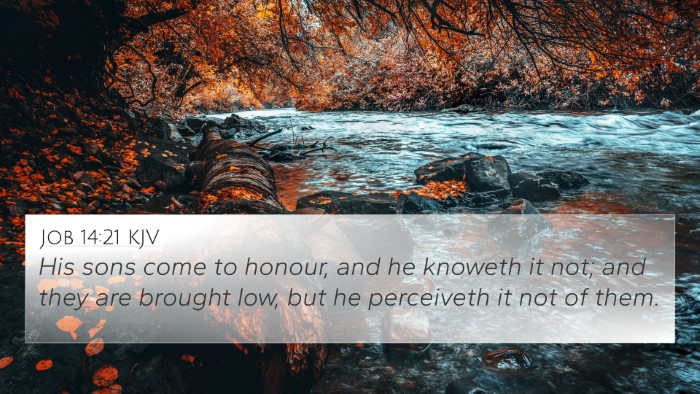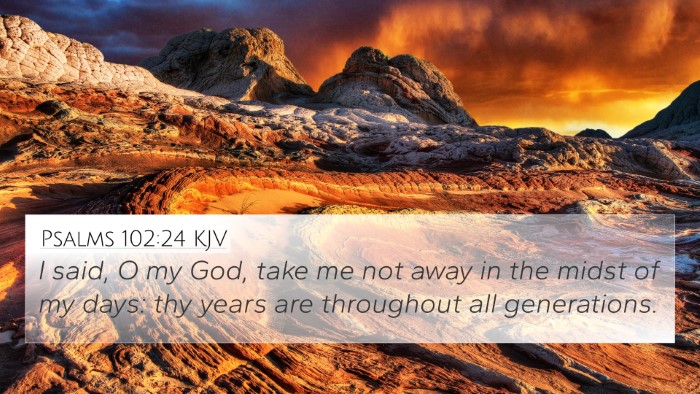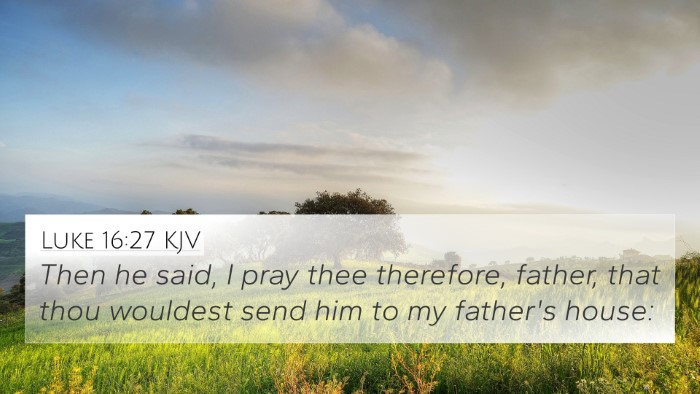Understanding Job 21:21
Job 21:21 states: "For what pleasure does he take in his home after he has gone down to the grave?" This verse is part of Job's response to his friends who have suggested that suffering is always a consequence of sin. Job challenges this notion by questioning the logic behind their perspective on divine justice and the fate of the wicked.
Key Themes in Job 21:21
- Suffering and Justice: Job highlights the apparent prosperity of the wicked, challenging the belief that suffering is always a result of wrongdoing.
- The Nature of Death: The verse reflects on the finality of death and the questions it raises about life and the afterlife.
- Human Perspective on Divine Matters: Job's lament underscores the limitations of human understanding when interpreting God's actions.
Commentary Insights
According to Matthew Henry, Job is expressing his perplexity about the fate of the wicked. He argues that their prosperous lives do not align with the typical understanding of divine justice, suggesting that God does not immediately punish sin as humans might expect. Henry indicates that Job's distress stems from observing those who live in apparent sin yet die without experiencing suffering.
Albert Barnes expands on this by emphasizing that Job is questioning the theological framework presented by his friends, who believe in direct retribution. He argues that this simplistic view fails to encompass the complexities of God's dealings with humanity. Barnes also points out that Job’s contemplation about the afterlife reveals the struggle to reconcile earthly experiences with eternal truths.
Adam Clarke adds that the lament reflects the struggle for righteousness in a world where evil often seems rewarded. Clarke's commentary highlights the existential questions raised by Job, particularly regarding the certainty of God's justice and the fate of the soul after death. He suggests that Job's words serve as a challenge to rigid interpretations of divine retribution.
Bible Cross References
Job 21:21 connects to numerous verses throughout the Bible, emphasizing the themes of divine justice and human suffering. Here are some related references:
- Psalm 37:1-2: "Do not fret because of evildoers, nor be envious of the workers of iniquity. For they shall soon be cut down like the grass, and wither as the green herb." - This passage contrasts the fate of the wicked with the assurance of God's protection for the righteous.
- Habakkuk 1:4: "Therefore the law is slacked, and judgment doth never go forth: for the wicked doth compass about the righteous; therefore wrong judgment proceedeth." - This verse highlights the frustration of observing injustice.
- Ecclesiastes 8:14: "There is a vanity which is done upon the earth; that there be just men, unto whom it happeneth according to the work of the wicked; again, there be wicked men, to whom it happeneth according to the work of the righteous: I said that this also is vanity." - This exploration of existential justice connects with Job's questioning.
- Romans 9:14: "What shall we say then? Is there unrighteousness with God? God forbid." - Paul's assertion questions the nature of God's justice, reflecting the dilemmas raised by Job.
- Luke 16:25: "But Abraham said, 'Son, remember that in your lifetime you received your good things, and likewise Lazarus evil things; but now he is comforted and you are tormented.'" - This New Testament parable echoes Job's considerations of justice after death.
- Revelation 20:12: "And I saw the dead, great and small, standing before the throne, and books were opened. Then another book was opened, which is the book of life. The dead were judged according to what they had done as recorded in the books." - This verse affirms that deeds are accounted for, resonating with Job's reflections on life and justice.
- Proverbs 11:21: "Though they join forces, the wicked will not go unpunished; but the posterity of the righteous will be delivered." - This assures that justice will ultimately prevail, in contrast to Job's experience.
- Job 24:1: "Why are times not kept by the Almighty, and why do those who know him never see his days?" - This closely relates to Job's central theme of questioning God's timing and justice.
- 2 Corinthians 5:10: "For we must all appear before the judgment seat of Christ, that each one may receive the things done in the body, according to what he has done, whether good or bad." - This New Testament reference emphasizes accountability that transcends earthly life.
Thematic Connections
The narratives within Job and cross-referenced verses highlight several important themes in Scripture:
- The Problem of Evil: The Bible consistently addresses why bad things happen to good people and provides insights into God's justice.
- The Afterlife and Accountability: Many verses address what happens after death, affirming that earthly life is a prelude to eternal consequences.
- Divine Justice vs. Human Understanding: Both Job and the cross-referencing verses reveal the discrepancies between human perception and divine reality.
Conclusion
Job 21:21 serves as a profound meditation on the nature of justice and the human condition. Through the insights of various commentators and the connections to other scriptures, we gain a richer understanding of Job's struggle and the timeless questions about life, death, and divine fairness. By exploring these themes and references, readers can engage in deeper studies, identifying connections between Bible verses and enriching their spiritual journey.
For those interested in further study, tools for Bible cross-referencing can enhance understanding, uncovering links between scriptures and fostering a more comprehensive grasp of biblical themes.
